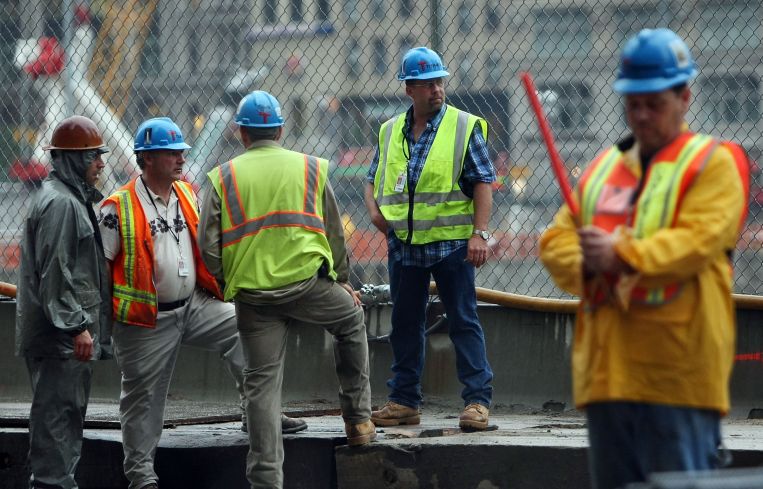City Council Approves Construction Safety Training Bill
Workers will have to quadruple their hours of construction training by 2020
By Liam La Guerre September 27, 2017 4:46 pm
reprints
The City Council voted unanimously (42-0) in favor of a controversial bill today that will significantly increase the number of safety training hours required for construction workers.
The legislation, Intro-1447-C, will require workers to have at least 40 hours of safety training on construction sites by September 2020. Today, workers are need to have just 10 hours of safety training. The new law will also create a 14-member task force to oversee that the training hours are met.
The bill has pitted union contractors, who are in support, against a variety of groups such as the Real Estate Board of New York, civic advocates and nonunion contractors. Those groups believe that the legislation will benefit the unions, which already require workers to have 30 hours of training, and have training facilities. And they say, it will force nonunion contractors to pay for more safety training for workers, increasing overall project costs.
During the City Council meeting before the vote, the bill’s co-sponsor, Jumaane Williams, thanked Gary LaBarbera, the president of the Building and Construction Trades Council of Greater New York, and said that REBNY “told untruths.”
He explained that LaBarbera, who represents more than 100,000 union workers, continued to stay at the table even though the bill didn’t have everything the union chief wanted. LaBarbera was pleased with the outcome.
“Intro 1447 will be a significant step in the right direction for improving worker safety and standardizing rigorous training in New York City,” LaBarbera said in a statement following the vote. “I want to thank the New York City Council for taking up this important issue and getting the job done with a unanimous vote on behalf of all the hard working construction workers of New York City.”
And while Williams did not explain specifically what he meant when he said REBNY was untruthful, paraphrasing late singer Rick James, he said, “The love of money is a hell of a drug.”
He later added: “This bill is not perfect. I just ask for folks to…focus on things that need to be tweaked.”
REBNY responded via Twitter: “It’s unfortunate that [Williams] resorts to name-calling, and more unfortunate that he can’t answer basic questions about his bill. How will tens of thousands of workers access construction safety training? How will they pay for it? What steps are being taken to curb fraudulent safety cards? Why not subject all workers to Intro. 1447-C’s training requirements?”
Last week, the City Council’s subcommittee on housing and buildings (for which Williams is the chairperson) voted to approve the bill unanimously, as CO previously reported. The following day two construction workers died while working on separate sites. One worker was a member of a union while the other was not, according to a spokesman for the Buildings and Construction Trades.
Last Thursday, nonunion worker Juan Chohillo, a 43-year-old Queens man, fell in the morning from the construction site at 161 Maiden Lane between South and Front Streets. It is going to be a 670-condominium building called 1 Seaport. Later that day, union laborer Joseph Pacheco, a 45-year-old worker from the Bronx, fell from 1 Manhattan West, also known as 401 Ninth Avenue, according to the New York Police Department.
Because of the recent deaths and others throughout the year, Williams’ colleagues praised his work on the bill and congratulated him and co-sponsor Councilmember Carlos Menchaca.
“Once again this council has demonstrated that we value people over profit,” Councilmember I. Daneek Miller said. “No other industry would have seen the lost of 40 lives over the past year and we would have stood for that.”
The effects of the law will be phased in. If they don’t already have it, workers are expected to get 10 hours of safety training by March 1, 2018. Then they have six months to get at least 20 more hours. After that, the task force will decide if the required hours should be raised to at least 40 and up to 55.
The New York Construction Alliance (NYCA), a group of construction managers that support the open-shop concept (using the best company for a job regardless of union or nonunion affiliation), voiced displeasure for the passing of the bill. The group hopes that it will at least be able to get its nonunion members on the task force. (Members are appointed by Council Speaker Melissa Mark-Viverito and Mayor Bill de Blasio.)
“It would reflect well on the council and mayor’s office in their stated commitment to transparency, deliberation and equity, if some of our members were considered for representation on the task force, in order to provide expert insight and analyses on how to best facilitate the mandates outlined in the bill,” NYCA’s Executive Director Kenneth Thomas, said in a prepared statement.



